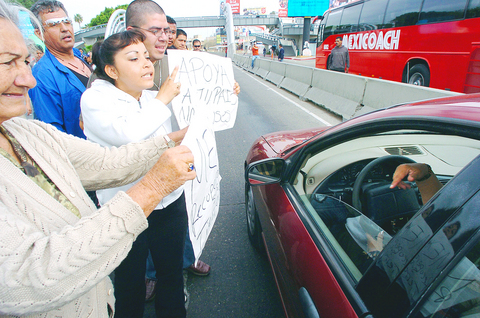Mexicans blocked border crossings, thronged city streets and shunned US-owned stores and restaurant chains in "A Day Without Gringos," supporting rallies across the US demanding immigration reform.
The spillover effect from protests and boycotts in the US was tough to measure south of the border on Monday because May 1 is a holiday that closes schools, as well as many businesses and offices.
But major US chains like Wal-Mart, McDonald's and Burger King were open -- and, while some locals stayed way, they were far from deserted in Mexico City.

PHOTO: AP
Shopping at Wal-Mart, 28-year-old salesman Juan Ortiz said he supported legalizing migrants, but didn't think it was practical to boycott US goods.
"You have to buy what is least expensive here, and I have to buy things for my family," he said.
In the border city of Tijuana, across from San Diego, about 400 boycott supporters blocked half the access lanes to an international bridge to discourage Mexicans from crossing into the US to shop.
In another border city, Nuevo Laredo, protesters blocked a bridge over the Rio Grande into Texas for a few hours.
Far more visible, however, were the protests of thousands of unionized workers, who dedicated annual May 1 marches to immigration, carrying banners that read "Total Support for Migrants."
"Legalization for all migrants. We are going for the legalization of all in the US," said marcher Ada Omana, who lives in Chicago and serves as migrant-affairs secretary for the leftist Democratic Revolution Party.
"Legalization is not a prize, it's a recognition of our work," she said.
The protests coincided with a "Day Without Immigrants" in the US, where hundreds of thousands of mostly Hispanic immigrants skipped work and took to the streets.
Some in Mexico saw the marches as the beginning of a new, cross-border Latino movement.
"This is a great revolution of the bronze race, the brown race," Marti Batres, Democratic Revolution's Mexico City director, told a rally. "Our nation goes beyond the Rio Bravo [Rio Grande]," he said, noting that half of Mexico's territory became the western US.
Masked Zapatista rebel leader Subcomandante Marcos told a rally of about 2,000 supporters outside the US Embassy that immigrants in the US are "fighting in the belly of the beast."
"As Zapatistas, we support the boycott of all the US products that have proliferated in Mexico," he said, vowing to "expel from our land all the rich and powerful ... including, of course, US capitalists."
The Zapatistas led a brief armed uprising in 1994 in the southern state of Chiapas to demand greater Indian rights, and have since been locked in an uneasy truce with the government.
Federal officials tried to distance themselves from the events. Still, Roberto Madrazo, one of three major candidates vying to replace outgoing President Vicente Fox in elections July 2, promised not to buy any product with US roots.
At least a half-dozen state governors also endorsed the boycott of US companies.
Pro-immigration rallies were also held throughout Central America. In Honduras, union members boycotted US soft drinks and fast food.

MONEY GRAB: People were rushing to collect bills scattered on the ground after the plane transporting money crashed, which an official said hindered rescue efforts A cargo plane carrying money on Friday crashed near Bolivia’s capital, damaging about a dozen vehicles on highway, scattering bills on the ground and leaving at least 15 people dead and others injured, an official said. Bolivian Minister of Defense Marcelo Salinas said the Hercules C-130 plane was transporting newly printed Bolivian currency when it “landed and veered off the runway” at an airport in El Alto, a city adjacent to La Paz, before ending up in a nearby field. Firefighters managed to put out the flames that engulfed the aircraft. Fire chief Pavel Tovar said at least 15 people died, but

LIKE FATHER, LIKE DAUGHTER: By showing Ju-ae’s ability to handle a weapon, the photos ‘suggest she is indeed receiving training as a successor,’ an academic said North Korea on Saturday released a rare image of leader Kim Jong-un’s teenage daughter firing a rifle at a shooting range, adding to speculation that she is being groomed as his successor. Kim’s daughter, Ju-ae, has long been seen as the next in line to rule the secretive, nuclear-armed state, and took part in a string of recent high-profile outings, including last week’s military parade marking the closing stages of North Korea’s key party congress. Pyongyang’s official Korean Central News Agency (KCNA) released a photo of Ju-ae shooting a rifle at an outdoor shooting range, peering through a rifle scope

South Korea would soon no longer be one of the few countries where Google Maps does not work properly, after its security-conscious government reversed a two-decade stance to approve the export of high-precision map data to overseas servers. The approval was made “on the condition that strict security requirements are met,” the South Korean Ministry of Land, Infrastructure and Transport said. Those conditions include blurring military and other sensitive security-related facilities, as well as restricting longitude and latitude coordinates for South Korean territory on products such as Google Maps and Google Earth, it said. The decision is expected to hurt Naver and Kakao

Gaza is rapidly running out of its limited fuel supply and stocks of food staples might become tight, officials said, after Israel blocked the entry of fuel and goods into the war-shattered territory, citing fighting with Iran. The Israeli military closed all Gaza border crossings on Saturday after announcing airstrikes on Iran carried out jointly with the US. Israeli authorities late on Monday night said that they would reopen the Kerem Shalom crossing from Israel to Gaza yesterday, for “gradual entry of humanitarian aid” into the strip, without saying how much. Israeli authorities previously said the crossings could not be operated safely during